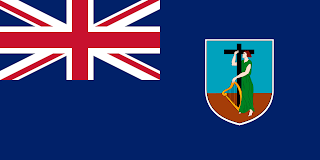On Barbados's national day it only seems right to add their flag from our church's multi-national congregation.
As it happens, today Barbados became a Republic. The flag will survive this transition because it already represents the same sense of antagonism and freedom-seeking that spawned republicanism - the broken trident symbolising the end of colonial rule at the country's independence in 1966.
There is not much to be said about this flag (which simply won a competition at independence). For me the broken trident reminds us of the way humankind turns paradises into problems - as in the Garden of Eden. The beauty of Barbados, the yellow sand and the blue sea represented here, has a human imprint represented by the trident. Slavery, colonialism that did not go well for the island, an angry independence which is still represented in today's transition over 50 years later brood over its natural beauty.
The human story is not the best story in the world without its Saviour and true Monarch.


